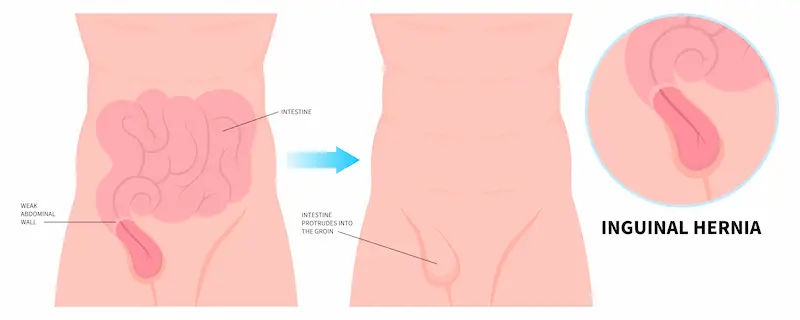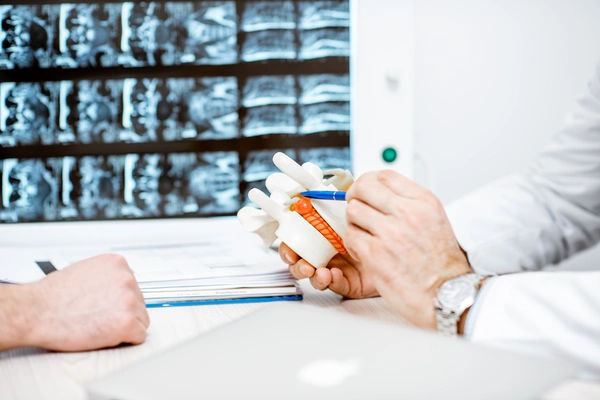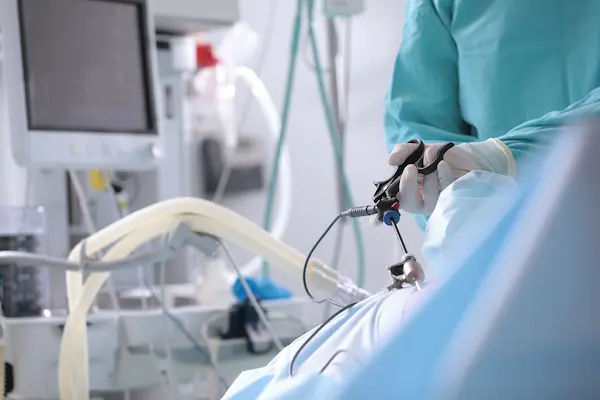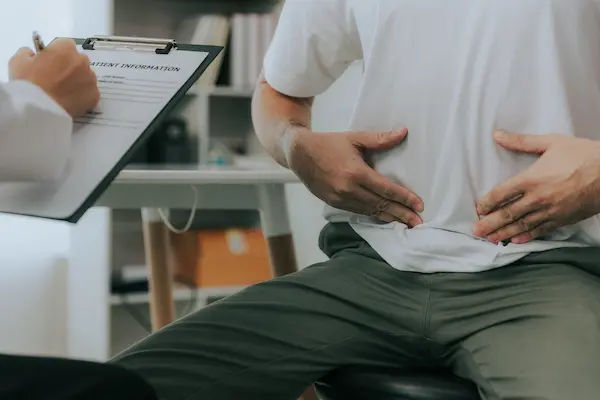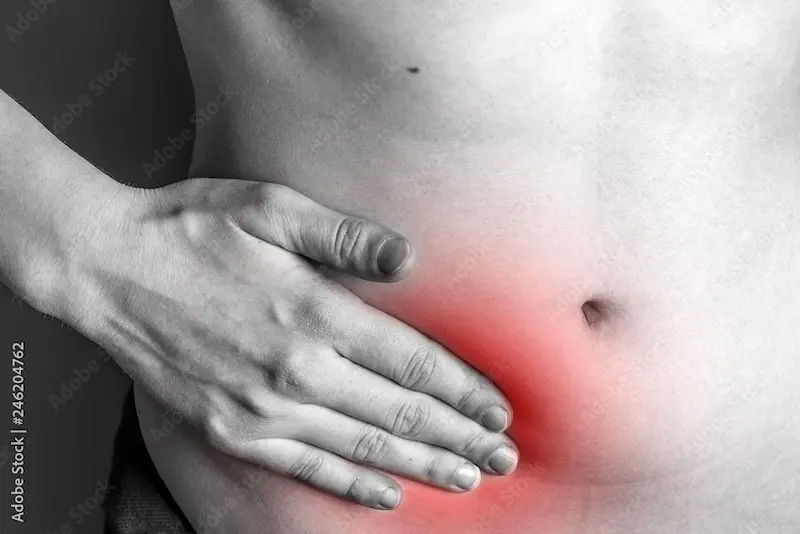Hernia Overview: Symptoms, Treatment, and Causes
Learn about hernia, its symptoms, causes, and treatment options. Understand how hernias develop, signs to watch for, and available methods for effective management.

Written by Dr. J T Hema Pratima
Reviewed by Dr. Dhankecha Mayank Dineshbhai MBBS
Last updated on 13th Jan, 2026

Introduction
A hernia is a common medical condition that occurs when an organ or fatty tissue pushes through a weak spot in the surrounding muscle or connective tissue. While hernias can develop in different parts of the body, they most commonly appear in the abdomen or groin area. If left untreated, some hernias can lead to serious complications. The good news is that hernias are treatable, and early diagnosis can help prevent further problems.
In this article, we’ll discuss what a hernia is, its symptoms, causes, and treatment options in simple terms.
What Is a Hernia?
A hernia happens when an internal organ (usually the intestine) bulges out through a weak spot in the muscle or tissue that holds it in place. Think of it like a tire with a weak spot: the inner tube (intestine) pushes through the outer layer (muscle wall).
Consult a General Surgeon for the best advice
Common Types of Hernias
Hernias can occur in various parts of the body. Here are the common types of hernias:
1. Inguinal Hernia – Occurs in the groin area, more common in men.
2. Femoral Hernia – Also in the groin but more frequent in women.
3. Umbilical Hernia – Found near the belly button, common in babies.
4. Hiatal Hernia – Part of the stomach pushes into the chest through the diaphragm.
5. Incisional Hernia – Develops at the site of a previous surgical incision.
Symptoms of a Hernia
Not all hernias cause symptoms, but when they do, you may notice:
- A visible bulge (especially when coughing, bending, or lifting heavy objects).
- Pain or discomfort in the affected area (usually worsens with activity).
- A burning or aching sensation at the bulge site.
- Heaviness or pressure in the abdomen.
- Digestive issues (in hiatal hernias, such as heartburn or difficulty swallowing).
When to Seek Immediate Help:
If the hernia becomes suddenly painful, turns red or purple, or causes nausea/vomiting, it may be strangulated (a medical emergency where blood supply is cut off). Seek medical attention immediately.
What Causes a Hernia?
Hernias develop due to a combination of muscle weakness and strain. Some common causes include:
- Heavy lifting (without proper technique).
- Chronic coughing or sneezing (due to smoking, asthma, or allergies).
- Pregnancy (increased pressure on the abdomen).
- Obesity (extra weight strains muscles).
- Constipation (straining during bowel movements).
- Previous surgery (weakens the abdominal wall).
- Ageing (muscles naturally weaken over time).
How Is Hernia Diagnosed?
Doctors usually diagnose a hernia through:
- Physical examination (checking for a bulge when you cough or stand).
- Imaging tests (ultrasound, CT scan, or MRI for confirmation).
If you suspect a hernia, it’s best to consult a doctor early to prevent complications.
Treatment Options for Hernia
Treatment depends on the type and severity of the hernia.
1. Watchful Waiting (For Small, Painless Hernias)
- If the hernia is small and not causing problems, doctors may monitor it.
- Lifestyle changes (avoiding heavy lifting, managing weight) can help prevent worsening.
2. Surgery (For Symptomatic or Large Hernias)
Most hernias require surgery to prevent complications. There are two main types:
- Open Hernia Repair – A surgeon makes an incision to push the hernia back and reinforce the weak area with mesh.
- Laparoscopic (Keyhole) Surgery – Small incisions and a camera-guided approach for faster recovery.
3. Lifestyle & Home Remedies
- Avoid heavy lifting or use proper lifting techniques.
- Maintain a healthy weight to reduce abdominal pressure.
- Eat fibre-rich foods to prevent constipation.
- Quit smoking to reduce chronic coughing.
- Exercise carefully (focus on strengthening core muscles).
Can Hernias Be Prevented?
While not all hernias can be prevented, you can reduce the risk by:
- Strengthening abdominal muscles (with safe exercises).
- Maintaining a healthy weight.
- Avoiding excessive straining (lifting, coughing, or during bowel movements).
- Eating a high-fibre diet to prevent constipation.
When Should You See a Doctor?
If you notice a bulge, discomfort, or any signs of a hernia, consult a doctor. Early treatment prevents complications like strangulation, which can be life-threatening.
Final Thoughts
Hernias are common but manageable. By understanding the symptoms, causes, and treatment options, you can take the right steps to protect your health. If you experience any signs of a hernia, don’t ignore them; seek medical advice promptly.
Consult a General Surgeon for the best advice
Consult a General Surgeon for the best advice

Dr Anubhav Chittari
General Surgeon
3 Years • MBBS, M.S GENERAL SURGERY
Bengaluru
PRESTIGE SHANTHINIKETAN - SOCIETY CLINIC, Bengaluru
Dr Sumanth R
General Physician
2 Years • MBBS
Bengaluru
PRESTIGE SHANTHINIKETAN - SOCIETY CLINIC, Bengaluru
Dr. Naziya Rahim Bhatia
General Surgeon
7 Years • MBBS ,MS
Bengaluru
Apollo Clinic, Sarjapur Road, Bengaluru
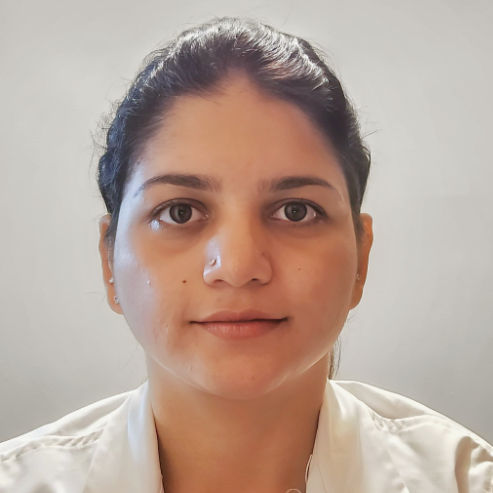
Dr Bhumika Lalwani
General Surgeon
4 Years • MBBS MS
Bengaluru
PRESTIGE SHANTHINIKETAN - SOCIETY CLINIC, Bengaluru

Dr Venu Kumar K N
Vascular Surgeon
10 Years • MBBS, MS (Surg), DNB (Surg), M.Ch (Vas Surg), DrNB (Vas Surg)
Bengaluru
Apollo Clinic, JP nagar, Bengaluru
Consult a General Surgeon for the best advice

Dr Anubhav Chittari
General Surgeon
3 Years • MBBS, M.S GENERAL SURGERY
Bengaluru
PRESTIGE SHANTHINIKETAN - SOCIETY CLINIC, Bengaluru
Dr Sumanth R
General Physician
2 Years • MBBS
Bengaluru
PRESTIGE SHANTHINIKETAN - SOCIETY CLINIC, Bengaluru
Dr. Naziya Rahim Bhatia
General Surgeon
7 Years • MBBS ,MS
Bengaluru
Apollo Clinic, Sarjapur Road, Bengaluru

Dr Bhumika Lalwani
General Surgeon
4 Years • MBBS MS
Bengaluru
PRESTIGE SHANTHINIKETAN - SOCIETY CLINIC, Bengaluru

Dr Venu Kumar K N
Vascular Surgeon
10 Years • MBBS, MS (Surg), DNB (Surg), M.Ch (Vas Surg), DrNB (Vas Surg)
Bengaluru
Apollo Clinic, JP nagar, Bengaluru
